D.A. Carson Logos 7 Exclusive Bundle (49 vols.)
Digital Logos Edition
Overview
Available only to customers who purchase a Logos 7 Base Package, this collection includes D.A. Carson's most influential and most recent titles. It covers the entire spectrum of Christian academic research, including theology biblical studies, Christianity in contemporary society, ethics, and more. It also includes key volumes that Carson edited or provided substantive contributions to, including Commentary on the New Testament Use of the Old Testament, The Enduring Authority of the Christian Scriptures, and Fallen: A Theology Sin.
- Includes nearly 50 titles with contributions by D.A. Carson
- Features key edited works, classic titles, and recent publications
- Addresses key issues from every major discipline of Christian acdemic enquiry
- Title: D.A. Carson Logos 7 Feature Bundle
- Volumes: 49
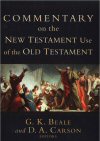
Readers of the New Testament often encounter quotes or allusions to the Old Testament that may be unfamiliar or obscure. In this volume, G.K. Beale and D.A. Carson have brought together a distinguished team of scholars to isolate, catalog, and comment on both the obvious Old Testament quotations and the more subtle allusions found in the New Testament. The result is a comprehensive commentary on the Old Testament references that appear from Matthew through Revelation. It is a vital resource for the reference library of every student of the New Testament.
This really is a new sort of commentary! For the first time we are given a continuous exegetical reading of the way each New Testament book quotes, alludes to, and evokes the Old Testament Scriptures. This volume will be an immensely useful resource for all kinds of study of the New Testament.
—Richard Bauckham, professor, New Testament studies, St. Mary’s College, University of St. Andrews
Finally a volume that surveys the use of the Old Testament in each book of the New Testament. Written by top-tier scholars with unsurpassed expertise in New Testament exegesis, these essays model sound engagement with Scripture that quotes Scripture. This excellent collection is a must-read for all who wish to understand how the New Testament writers understood and used their Bible. This long-awaited volume deserves to become a standard text that will hopefully launch a new stage of fresh work in biblical research.
—Karen H. Jobes, Gerald F. Hawthorne Professor, New Testament Greek and Exegesis, Wheaton College
Every scholar would profit by having a copy of this thorough and judicious work on his or her desk. The authors have collected for us an immense amount of material and insight in a relatively short space, and many of us will be grateful for their efforts. This commentary is a profound witness to the unity of the Testaments in the mystery of Christ.
—Francis Martin, Cardinal Adam Maida Chair of Biblical Studies, Sacred Heart Seminary
Finally we have a work that examines the use of the Old Testament in the New Testament and covers the entirety of the New Testament in a single volume. Pastors, students, and scholars will profit from the careful attention to both the Old and New Testament contexts in which the citations occur, and they will be enriched by the theological depth represented in this important book.
—Thomas R. Schreiner, James Buchanan Harrison Professor, New Testament Interpretation, Southern Baptist Theological Seminary
More than a generation ago, C.H. Dodd and a few other scholars began sowing the seeds of a new and fruitful approach to reading Scripture, by studying the New Testament writers’ use of Old Testament texts. The present commentary thus represents the harvest of decades of research into the relationship between the Old and New Testaments. By carefully observing various factors, ranging from the textual to the theological, each contributor shows how the New Testament writers were not only careful readers of the Old Testament but also profound theologians themselves. The scholars on this superb team assembled by Beale and Carson distill many new and remarkable insights for exegesis and theology, all of which serve to demonstrate the explanatory power of this approach for the present and the future. This landmark volume should prove to be an invaluable resource for both the church and the academy—for pastors, teachers, and students alike, whether Protestant or Catholic—and for anyone wanting to go deeper into the heart of sacred Scripture. Indeed, Beale and Carson are to be thanked and congratulated for a momentous accomplishment.
—Scott Hahn, Pope Benedict XVI Chair of Biblical Theology and Liturgical Proclamation, St. Vincent Seminary; professor of scripture and theology, Franciscan University of Steubenville
G.K. Beale (PhD, University of Cambridge) is Kenneth T. Wessner Chair of Biblical Studies and professor of New Testament at Wheaton College Graduate School. He is the author or editor of several books, including The Right Doctrine from the Wrong Texts?, and commentaries on Revelation and 1 and 2 Thessalonians.
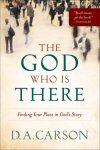
Most people—most Christians, even—don’t have a basic working knowledge of the Bible. How can we understand the story of God—and our part in it—when we’re not familiar with it? In this basic introduction to faith, D.A. Carson takes you through the story of Scripture to help you know what you believe and why you believe it.
Don Carson’s The God Who Is There is a unique and important volume in many ways. It is neither a traditional systematic theology nor a Bible survey. It unpacks the whole biblical storyline through the lens of God’s character and actions. As a ministry tool, it can be used for evangelism, since it so thoroughly lays out the doctrine of God, as Paul does on Mars Hill in Acts 17. And yet it also does what the catechisms of the reformation churches did: give Christians a grounding in basic biblical beliefs and behavior.
—Timothy Keller, pastor, Redeemer Presbyterian Church, New York City, NY
This is a much-needed book. D.A. Carson is one of the few biblical scholars who are gifted to write simply and in a way that captivates. We live in a time when people quickly reject or accept the Bible without even knowing its contents. Carson does a masterful job of explaining the Scriptures so that a person who has never even opened the Bible can understand it. At the same time, those who grew up under its teaching will find valuable and obvious truths that will lead them to greater worship and appreciation of the God we serve.
—Francis Chan, pastor, Cornerstone Community Church, Simi Valley, CA
What a wonderful resource! I love how Carson pulls together—in such an inviting way—God’s story from his Word! This book is a treasure for those who want to know what the Bible says as well as those of us who have read it, taught it, and lived it for years.
—Crawford W. Loritts Jr., senior pastor, Fellowship Bible Church, Roswell, GA
I am constantly on the lookout for good books for thoughtful students about issues of faith. The pickings are usually slim. D.A. Carson’s The God Who Is There offers a helpful resource I can heartily recommend. It is challenging yet respectful, thought-provoking yet accessible, faithful to the historic Christian faith yet relevant to our ever-changing world. I hope many students and faculty will give it serious consideration.
—Randy Newman, staff member, Campus Crusade for Christ
If you’ve ever wanted to hear God’s story, then this book is for you. If you’ve ever wanted to come face-to-face with the God who made, loves, and rescues you, then this book is for you. And if you’ve never picked up the Bible or wandered into a Christian church, then this book is especially for you.
—Sam Chan, lecturer in theology, preaching, and ethics, Sydney Missionary and Bible College, Australia
This may well prove to be one of the finest and most influential books D.A. Carson has written. A comprehensive apologia for the Christian faith, it is rooted in engaging exposition of major biblical texts, tracing the chronological story of God’s gospel grace with rich theological insight. Skillfully related to the objections and issues raised by twenty-first-century culture, it will inspire and equip any Christian who desires to communicate Christ more effectively and can confidently be given to any inquirer seeking to discover the heart of biblical faith. It is the best book of its kind I have read for many years.
—David J. Jackman, former president, Proclamation Trust
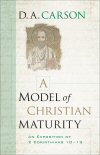
How do some of the Apostle Paul’s most passionate words help us understand our lives as Christians today? According to Bible scholar D.A. Carson, 2 Corinthians 10–13 clearly reveals Paul’s heart and mind. It contains such well-known passages as Paul’s description of his thorn in the flesh, as well as an intense chronicle of his specific sufferings. This section of Scripture also models Paul’s style of spiritual leadership and warns of false leadership in the church—something of crucial importance to anyone with an influential role in the body of believers.
Carson unpacks Paul’s call for us to embrace discipline and obedience and his thoughts on the nature of spiritual boasting. Through Paul we explore the struggles, opportunities, and intentions of a Christian under fire, journeying with him as he seeks to guide the Corinthian church and speak to us as well.
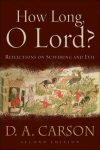
This clear and accessible treatment of key biblical themes related to human suffering and evil is written by one of the most respected evangelical biblical scholars alive today. Carson brings together a close, careful exposition of key biblical passages with helpful pastoral applications. The second edition has been updated throughout.
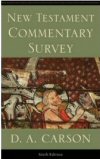
This much-anticipated sixth edition of the New Testament Commentary Survey offers students and pastors an updated look into available resources on the New Testament. Pastors, seminarians, and theology students will eagerly welcome this invaluable tool into their biblical studies libraries. In this succinct yet thorough survey, Carson examines sets, one-volume commentaries, and New Testament introductions and theologies, before offering extensive comments on the available offerings for each New Testament book, noting intended audience, levels of difficulty, and theological perspective. He records the publisher, price, and current publication status, identifies those texts he considers overpriced, and advises readers when to delay purchase for forthcoming works. The book concludes with a useful “Best Buys” section where Carson indicates the most valuable works for each individual New Testament book.
The seventh edition of the New Testament Commentary Survey is now available in the Baker Academic Biblical Studies Upgrade!
The multiplication of commentaries and monographs on individual books of the New Testament, and the difficulty of discerning the wheat from the chaff, makes this book a valuable resource indeed—a must read for the student or pastor who is building his or her library. Don Carson’s expert guidance will save the beginning student from many bad purchases . . . Carson certainly provides all one needs to arrive at a ‘short list’ of necessary resources and to be acquainted with the potential pitfalls and strengths of most books that a student might encounter in the course of researching an exegetical paper. This book is highly recommended.
—David A. DeSilva, Ashland Theological Journal
Numerous students, ministers—and, I suspect, theological teachers—will have used previous editions of this invaluable little book . . . As a reference tool, Carson’s book is a gold mine of informed judgment. It is a great strength of the book that Carson does not place value on a book because it confirms his theological position but because it helps the careful and critical reader better understand the biblical text. Yet Carson is prepared to indicate clearly where an author’s presuppositions or methods influence his or her approach to the text in a negative way. In fact, to read through this book is to get a concise introduction to trends and key players in contemporary New Testament studies . . . If you have any intention of building up a personal library on the New Testament that is full of tools which are effective in aiding you to understand the meaning of the biblical text, read Carson before you spend your money. You may not always agree with his comments but you will be helped to make more informed choices.
—Themelios
This is the most useful survey of New Testament commentaries currently available.
—John F. Brug, Wisconsin Lutheran Quarterly
Carson’s work is most valuable and his perceptive remarks will serve pastors and students well.
—David S. Dockery, Review and Expositor
[An] eminently useful survey . . . The author has developed a running narrative approach which is refreshing and much more readable than the traditional bibliographic method . . . This work is highly recommended for both its informative value and the unique accomplishment for a bibliography, it is interesting and entertaining to read.
—Dennis M. Swanson, Master’s Seminary Journal
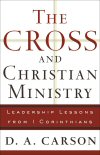
It’s common today to see the image of the cross adorning churches, dangling from necklaces, and gleaming from lapels. Yet that image, so sanitized for us today, was grotesque and abhorrent to those living in the first century—a symbol of evil, torture, and shame. It’s this realistic and horrifying view of the cross that should call us to Christian ministry and compel us to share the Good News of Christ’s triumph over death.
Through his exposition of 1 Corinthians, D.A. Carson presents a comprehensive view of what the death of Christ means in preaching and ministering to God’s people. He confronts factionalism, servant-leadership, shaping “world” Christians, and the source of knowledge in order to help Christian leaders learn principles for dynamic, cross-centered worship.
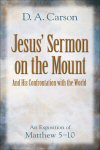
“I am deeply convinced that the church of Christ needs to study the Sermon on the Mount again and again,” writes D.A. Carson. In his popular explanation of Jesus’ teaching in Matthew 5–10, this renowned author clearly presents the inescapable demands on the believer to live a pure and dedicated life.
As Carson covers the Sermon on the Mount and the events that follow, he blends good writing, thoughtful exposition, and consistent respect for the authority of Jesus’ words. Bible teachers in church and parachurch groups, thoughtful Christians who want more than a surface-level devotional, and pastors who preach on Matthew 5–10 will find rich insights and practical applications in this book. Two included appendixes summarize the various critical approaches to and theological interpretations of the Sermon on the Mount. These appendixes will help readers view Carson’s interpretation with a more balanced vision and deeper understanding.
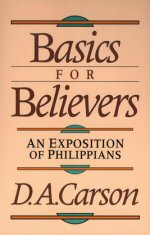
Basics for Believers is for Christians taking the first steps of faith as well as experienced saints reexamining spiritual foundations. Both will gain exceptional instruction and encouragement from this fresh look at the fundamental disciplines of the Christian life.
To ensure persistent progress in your journey of faith, Carson urges believers to:
- Put the gospel first in your relationships, prayer life, career goals, and personal choices
- Take the right perspective on the cross and let it shape your outlook on suffering, witnessing, and persevering for the faith
- Emulate Christian leaders who model compassion, faithfulness, confidence in Christ, and heavenly mindedness.
- Resolve never to give up the Christian walk but instead to pursue the same seven virtues Paul enjoins upon the Philippians.
This summons to “get back to the basics” lays a solid foundation for withstanding storms that beat upon the house of faith today.
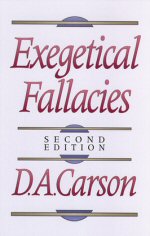
Serious exegesis of the Scriptures is one of the most worthwhile practices any Christian can undertake. But it is not without its dangers. In Exegetical Fallacies, Carson helps readers discern improper interpretation techniques, and explains sound grammatical, lexical, cultural, theological, and historical Bible study practices. With its accessible style and plain language, Exegetical Fallacies will be an edifying contribution to any Bible study.
This book . . . is a must for teachers, pastors, and serious Bible students.
—Thomas Schreiner, professor of New Testament interpretation, Southern Baptist Theological Seminary
The reader who does not confuse the Bible’s inerrancy with his own interpretations will receive valuable guidance from the book. Carson has furnished a pithy and practical manual of many of those mistake to which all of us who deal with the text in earnest fall prey.
—Robert Yarbrough, chair of the New Testament department, associate professor of New Testament, Trinity Evangelical Divinity School
. . . well written, easy to read, and thought-provoking. It is highly recommended to all who truly desire to handle accurately the world of truth (2 Tim. 2:15)
—Jeff Guimont, Grace Theological Journal
Written by an evangelical for evangelicals, this practical treatise is worthy of wider circulation among preachers of others persuasions.
—Casimir Bernas, Religious Studies Review
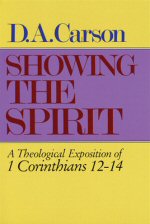
In Showing the Spirit, Carson speaks to one of evangelism’s most troublesome issues: spiritual gifts. The book expounds the crucial passage, 1 Corinthians 12–14. Partisans on both sides of charismatic issues are challenged by the unbiased consideration of nuances in the Greek text found in 1 Corinthians.
Carson interacts with some other Christian doctrines, as well as with findings of linguists, social anthropologists, and historians. The concluding chapter integrates material from other portions of Scripture—especially the book of Acts—so that the author’s conclusions reflect all of the biblical evidence. “We must even-handedly attempt to weigh all the relevant evidence,” Carson writes, “even while we insist that the authority of Scripture must prevail.”
An excellent book which could do much to bring together charismatics and noncharismatics in a common understanding and experience of the Spirit.
—I. Howard Marshall, honorary research professor, New Testament, University of Aberdeen
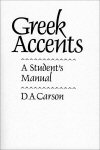
Here is everything you need to know about New Testament Greek accents—a subject often slighted or ignored by introductory grammars. Those “grammars which deal with accents scatter their information throughout their pages,” writes the author, “and some of that information I soon discovered to be correct for Attic Greek, but incorrect for the Greek of the New Testament.” Along with a step-by-step presentation of the rules of accenting, illustrated by examples, this manual provides practice exercises and an answer key to aid comprehension.
For students who do want to learn accents, this book is a must. It is clearly organized and written, thorough, pedagogically sound, and free of misprints.
—Review and Expositor
Supplies the need for major study explaining how accents work. . . . Puts much information together in such a well-packaged form.
—Bibliotheca Sacra
[Provides] all the things you ever wanted to know about New Testament Greek accents. . . . Students will find themselves with a more complete knowledge of the original language of the New Testament.
—ADRIS Newsletter
Everything is beautifully clear and the many paradigms and examples should make it excellent for learning. . . . The learner is not likely to be left at a loss at any point.
—Expository Times
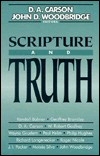
In what sense is the Bible the Word of God for Christians today? How should we think of the truthfulness of the Bible?
Scripture and Truth seeks to answer these key questions. It synthesizes, as have few other works, the apologetic reasons for an evangelical defense of biblical inerrancy. From a biblical, historical, or theological perspective each essay examines a challenge to belief in the integrity and reliability of Scripture. What emerges from these essays is a full-orbed restatement of this evangelical doctrine.
First published in 1983, Scripture and Truth will continue to strengthen the faith of many of God’s people in his reliable and truthful Word.
Here is a book which is more than a mere defense of biblical inerrancy; it seeks also to explore the implications of such a view of the way in which we approach and handle Scripture.
—Peter Misselbrook, Evangelical Times
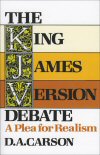
“The King James Version is superior to all modern English translations of the Bible”—so say many popular books and pamphlets. The King James Version Debate is the first book-length refutation of this point of view written for both pastors and laymen. The author concisely explains the science of textual criticism, since the main premise advanced by KJV proponents is the superiority of the Greek text on which it is based.
After showing the problems with this premise, the author refutes the common propositions that:
- The KJV is the most accurate translation
- It is the most durable
- Its use of the Old English forms (e.g., “thou”) makes it the most reverent
- It honors Christ more than do other versions
- It is the most easily memorized
- It is the most suitable for public reading
Concluding the book is an appendix in which, on a more technical level, the author answers W. N. Pickering’s The Identity of the New Testament Text, the most formidable defense of the priority of the Byzantine text yet published in our day.
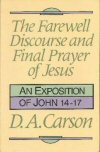
In The Farewell Discourse and Final Prayer of Jesus, D.A. Carson offers a penetrating exposition of John 14–17—the finale of Jesus’ teaching. These short studies touch on many of the great themes of the Christian faith, held together by the experience of the cross that loomed over Christ and his disciples at Gethsemane.
Here is scholarship at its best, a clear, well-reasoned, understandable account.
—Evangelical Times
. . . highly recommended for its homiletical and expositional values. The preacher who likes to prepare expository sermons will find invaluable guidelines in exegesis, illustrations, and inspirational poetry.
—Seminary Review

God doesn’t demand hectic church programs and frenetic schedules; he only wants his people to know him more intimately, says top-selling author D.A. Carson. The apostle Paul found that spiritual closeness in his own fellowship with the Father. By following Paul’s example, we can do the same. This book calls believers to reject superficiality and revolutionize their lives by embracing a God–guided approach to prayer.
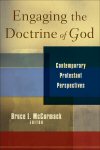
Traditionally, evangelical theology has been committed to a position of classical theism, emphasizing God’s immutability and omniscience. Of late, traditional affirmations have been challenged by theologians who affirm a more Christological focus (often drawing from Karl Barth’s theology) and by those who affirm a theology of “open theism.”
The essays gathered in this collection give evidence of the depth and creativity of contemporary evangelical theology as well as the variety of positions held by those within the movement. Part one focuses on New Testament studies and the earliest development of a Christian doctrine of God. Part two considers two figures who have significantly influenced evangelical theology. Part three examines the cross, the suffering and sovereignty of God, and the contemporary debate, and part four concludes with a chapter on theology and pastoral care.
Both scholars and clergy will find that these essays represent the range of thought within the evangelical tradition. The contributors provide readers with a stimulating guide to the contemporary debate.
Contributors:
- Pierre Berthoud
- Henri A. Blocher
- D.A. Carson
- Oliver D. Crisp
- Paul Helm
- Donald Macleod
- Bruce L. McCormack
- John Webster
- Stephen N. Williams
- David F. Wright
- N.T. Wright
One will find meaty essays here on an important topic: the doctrine of God. The inroads of philosophical secularism in the academy have injured orthodox presentations of God by many Christians. This book can help thoughtful Christians, not because the essays are all equally consistent in upholding orthodoxy, but because they present the parameters of the discussion in engaging ways.
—Logia
A very fine work. . . . McCormack describes Engaging the Doctrine of God as exploratory and a kick-start to a conversation. Indeed it is both. . . . Stimulating and theologically sophisticated material [is] found in this excellent book.
—Themelios
How to understand divine impassibility is a major theme of most of these essays. Some will interest a broader community of scholars working on the doctrine of God and be useful for seminary and graduate courses. Reformed theologians in particular may find the implicit debate between Helm and McCormack concerning Calvin and Barth’s understandings of God thought provoking.
—Religious Studies Review
Preachers will . . . welcome Engaging the Doctrine of God. . . . [It] present[s] fertile ground for serious theological reflection.
—Preaching
Evangelical theologians, ministers, students, and others interested in contemporary Protestant perspectives on the doctrine of God will find this an engaging and insightful book. It provides an excellent introduction to these important issues and makes a helpful contribution to the discussion.
—Bibliotheca Sacra
Bruce L. McCormack received his PhD from Princeton Theological Seminary, his MDiv from Nazarene Theological Seminary, his honorary DrTheol from Friedrich Schiller University. He is the Charles Hodge Professor of Systematic Theology at Princeton Theological Seminary. A world-renowned Barth scholar, he is a frequent writer and lecturer on topics of Reformed theology.
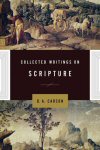
God’s Word has always had enemies, but in recent years the inspiration and authority of Scripture have been attacked with renewed vigor. Respected scholar D.A. Carson has written widely on the nature of Scripture over the past thirty years, and here presents a timely collection of his work in two parts.
In part 1, Carson selects essays written on such themes as how to interpret the Bible, recent developments in the doctrine of Scripture, unity and diversity in the New Testament, and redaction criticism. Presenting a theologically balanced and confessional perspective, Carson defines the terms of a number of debates, critiques interpretive methods and theories, and suggests positive guidelines for future action.
Part 2 presents critical reviews of nine books dealing with the inspiration and authority of Scripture. Though substantial in content, Carson’s detailed reviews will foster careful thought and perspective in those who are relatively new to the debates surrounding biblical inspiration and authority.
This volume is a diverse collection that will prove to be a helpful resource to both seasoned pastors and scholars and those who are just starting serious study of the Bible.
This book is a road map of pathways to pursue and pitfalls to avoid in handling Scripture. D.A. Carson would be the first to agree that God himself upholds his written word, the Bible. But God uses means. In recent decades, Carson’s voice has been among the most forthright, consistent, rigorous, faithful, and compelling in serving the vital divine end of testifying to Scripture’s veracity. This book guides readers to the priceless destination of confidence in God’s Word through refutation of its critics and commendation of its truth.
—Robert W. Yarbrough, professor of New Testament, Covenant Theological Seminary
D.A. Carson is one of the most prolific and profound biblical scholars of our generation. Perhaps it is not far-fetched to predict that his Collected Writings on Scripture will become a classic as an evangelical defense of Holy Scripture’s authority. Carson courteously but persuasively reveals the weaknesses of arguments designed by critics to discredit or render obsolete the historic teaching of the Western Christian churches, namely, biblical inerrancy. This book is a masterful, must read for those persons who want to understand better the nature of Scripture’s authority. The volume may very well take its place as a benchmark study, side by side with Inspiration (1881), the influential essay penned by A. A. Hodge and B. B. Warfield.
—John D. Woodbridge, research professor, church history and History of Christian thought, Trinity Evangelical Divinity School
D.A. Carson is for this generation what B. B. Warfield was for his—the scholarly stalwart for the doctrine of Scripture, possessed of prodigious skills both as an interpreter of Scripture and as a biblical and systematic theologian, critically engaging the most significant arguments of the day and upholding the historic position of the Christian church and the Bible’s own self-attestation. Everything that comes from his pen is worthy of careful attention. Given the current state of the doctrine of Scripture (in theory and practice) in evangelical academia, this is an important and timely volume. Seminarians and pastors alike need to be abreast of present trends in this vital subject. The classic essays and critical reviews in this book offer a bird’s-eye view of the past thirty years of the discussion, as well as world-class scholarship and discernment in articulating rejoinders to sub-biblical theories while positively presenting a faithful view of the inspiration and authority of the Scriptures and their entailments.
—J. Ligon Duncan, chancellor and CEO, Reformed Theological Seminary, Jackson, Mississippi
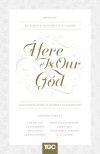
Here Is Our God: God’s Revelation of Himself in Scripture
- Authors: D.A. Carson, Kathleen B. Nielson, Nancy Leigh DeMoss, Timothy J. Keller, John Piper, Jenny Salt, Carrie Sandom, Paige B. Brown
- Editors: Kathleen B. Nielson and D.A. Carson
- Series: The Gospel Coalition (TGC)
- Publisher: Crossway
- Publication Date: 2014
- Pages: 224
Scripture records a number of instances in which God visibly revealed himself to his people, offering a glimpse of his stunning beauty and overwhelming glory. These awe-inspiring manifestations of God’s presence—known as “theophanies”—give us wonderful insights into his character, will, and salvation.
In this collection of biblical expositions, eight prominent Bible teachers explore key passages in which God displayed himself in a spectacular revelation. From the giving of the law at Mt. Sinai to Christ’s glorious transfiguration, the passages examined in this book challenge us to look afresh at our God—that we might truly know, love, and serve him.
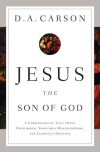
Although it is a foundational confession for all Christians, much of the theological significance of Jesus’s identity as “the Son of God” is often overlooked or misunderstood. Moreover, this Christological concept stands at the center of today’s Bible translation debates and increased ministry efforts to Muslims. New Testament scholar D.A. Carson sheds light on this important issue with his usual exegetical clarity and theological insight, first by broadly surveying Jesus’ biblical name as “the Son of God,” and then by focusing on two key texts that speak of Christ’s sonship. The book concludes with the implications of Jesus’ divine sonship for how modern Christians think and speak about Christ, especially in relation to Bible translation and missionary engagement with Muslims across the globe.
No christological designation is as essential as ‘Son of God’; none is more important. This study makes that impressively clear by sound and careful exegesis and theological reflection in the face of misunderstandings and disputes, past and current. Once again, D.A. Carson serves the church well.
—Richard B. Gaffin Jr., professor of biblical and systematic theology, emeritus, Westminster Theological Seminary
I know what it is to reject Jesus as the ‘Son of God.’ As a former Muslim, nothing baffled and, quite frankly, angered me more than hearing Christians call Jesus ‘the Son of God.’ I thought such persons were blasphemers worthy of condemnation. But now, nothing gives me more joy than to know that Jesus is indeed the Son of God and that the title ‘Son of God’ carries far more truth and wonder than I could have imagined. So I welcome this volume from D.A. Carson with all the enthusiasm and joy of one who once denied the truth that Jesus is the Son of God. With his customarily clear, warm, careful, and balanced manner, Carson gives us a fresh exploration of a precious truth that so many Christians take for granted and so many Muslims misunderstand. If you want to know Jesus and the Bible better, this surely is one aid that will not disappoint.
—Thabiti M. Anyabwile, pastor, Anacostia River Church, Washington, D.C.
What does it mean for us to confess that Jesus is the Son of God? D.A. Carson tackles this question in Jesus the Son of God. In this little book he lays a firm foundation to help the church understand ‘Son of God’ with reference to Jesus. After considering uses of ‘Son of God’ in Scripture, both in general and when applied to Jesus, Carson models the way systematic theology should be based on solid biblical exegesis. Carson is especially concerned to bring his study to bear on the controverted issue in missiological circles concerning how to present Jesus as Son of God in Christian and Muslim contexts. Here he critically, but kindly, calls for rethinking new translations that have replaced references to God the Father and Jesus as his Son to make them more acceptable to Muslims.
—Robert A. Peterson, professor of systematic theology, Covenant Theological Seminary
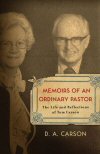
D.A. Carson’s father was a pioneering church-planter and pastor in Quebec. But still, an ordinary pastor-except that he ministered during the decades that brought French Canada from the brutal challenges of persecution and imprisonment for Baptist ministers to spectacular growth and revival in the 1970s.
It is a story, and an era, that few in the English-speaking world know anything about. But through Tom Carson’s journals and written prayers, and the narrative and historical background supplied by his son, readers will be given a first-hand account of not only this trying time in North American church history, but of one pastor’s life and times, dreams and disappointments. With words that will ring true for every person who has devoted themselves to the Lord’s work, this unique book serves to remind readers that though the sacrifices of serving God are great, the sweetness of living a faithful, obedient life is greater still.
This account gives us valuable insight into the life of a man who accepted the challenges of ministry with both integrity and grace, and into the life of a Protestant pastor in French Quebec. A powerful reminder that there are no little places if we are faithful to the God who called us.
—Erwin W. Lutzer, senior pastor, The Moody Church, Chicago, Illinois
How can the application of a Bible-saturated mind (Don’s) to a Bible-saturated life (Tom’s) produce an even more helpful story to encourage pastors? Let the ’mind’ be carried on a river of love because the ’life’ is his father’s. Then add a kind of narrative creativity. That’s how
—John Piper, chancellor, Bethlehem College and Seminary
A rare and precious gift from one of evangelicalism’s greatest scholars. How generous of Dr. Carson to bequeath his father’s quiet legacy to us all.
—C.J. Mahaney, senior pastor, Sovereign Grace Church of Louisville, Louisville, Kentucky
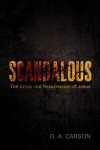
How are Christians to approach the central gospel teachings concerning the death and resurrection of Jesus? The Bible firmly establishes the historicity of these events and doesn’t leave their meanings ambiguous or open to interpretation. Even so, there is an irony and surprising strangeness to the cross. Carson shows that this strange irony has deep implications for our lives as he examines the history and theology of Jesus’s crucifixion and resurrection.
Scandalous highlights important theological truths in accessible and applicable ways. Both amateur theologians and general readers will appreciate how Carson deftly preserves weighty theology while simultaneously noting the broader themes of Jesus’ death and resurrection. Through exposition of five primary passages of Scripture, Carson helps us to more fully understand and appreciate the scandal of the cross.
Don Carson’s clarity in communicating Scripture is a great gift, and in this book, he gives it to us. This professor can preach. These are model messages on crucial passages. They are delicious meditations that instruct our minds and feed our souls. Biblical content—straight, ripped, hard, solid—this is what Carson gives us about Christ’s cross and resurrection. Read, mark, learn, and inwardly digest.
—Mark Dever, senior pastor, Capitol Hill Baptist Church, Washington D.C.
This is vintage Carson—informed exegesis and engaging exposition, theologically rich and devotionally warm, lucid, insightful, probing. God’s truth glows! Don Carson shows us what the Bible is for, and his words make me want to preach the scandalous cross of Christ with greater passion.
—Bill Kynes, senior pastor, Cornerstone Evangelical Free Church, Annandale, Virginia
Don Carson has provided a rich, thoughtful, and theologically honest introduction of the person and work of Jesus. With the biblical fidelity, clarity, and wisdom we have come to expect from his writings, Carson provides a treatment of the ironies of the cross not merely as a literary device but as a powerful analysis of the subversive, upside-down nature of the cross; namely, the powerful, redeeming, trusting king of the universe becoming a powerless, marginalized, and crucified savior. He believes that Jesus cried this cry, ’My God! I am forsaken?’ so that for all eternity we will not have to be. This is a scandalous picture of Jesus’ loving act of self-identification and self-donation for the godforsaken. We are grateful for his fruitful labors in showing us the irony of the mocked king who really is the king, not only for the Jews but also for the entire world.
—Stephen T. Um, senior minister, Citylife Presbyterian Church, Boston, Massachusetts
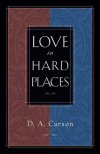
Too often the Christian version of popular culture’s sentimental view of love is that, of all things, Christians should be nice. After all, people ask, isn’t the Church about forgiveness? Aren’t Christians supposed to love others without condition?
This book not only focuses on the aspects of Christian love that are not easy–such as when it comes to loving our enemies, and even forgiving those loved ones who have hurt us–but also helps readers understand, then, what biblical love really is. As author D.A. Carson points out, thinking seriously about Christian love soon embroils us in reflection on justice, revenge, war, the authority of the state, forgiveness, hate, and much more. This book shows some of the important ways in which the love of Christians is a reflection of the love of God, and enables believers to develop an appropriate understanding of how to love in the hard places of life.
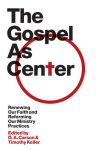
It’s time to reclaim the core of our beliefs... Important aspects of Christianity are in danger of being muddied or lost as relativism takes root in our churches today. What was historically agreed upon is now readily questioned and the very essentials of the Christian faith are in jeopardy. It’s time to reclaim the core of our beliefs.
To that end, D.A. Carson, Tim Keller, Kevin DeYoung, and other influential leaders have created this volume to defend the traditional gospel and to strengthen the church. The Gospel as Center will help you join in the movement—the movement dedicated to a Scripture-based reformation of ministry practices and the centrality of the gospel—and stand united under the conviction that what holds us together is worth fighting for.

The Difficult Doctrine of the Love of God
- Author: D.A. Carson
- Publisher: Crossway Books
- Publication Date: 1999
- Pages: 96
Table of Contents | Sample pages: 1 | 2 | 3
D.A. Carson presents a serious treatment of the doctrine of the love of God and an honest, biblically sound handling of its difficulties and problematic passages. He critiques sentimental ideas such as "God hates the sin, but loves the sinner" and provides interesting perspective on how God loves us. This discussion is blended with consideration of God's sovereignty and His wrath, both of which are important elements of His love, and does away with trivialities and cliches to get to the heart of the matter.
At first thought, understanding the doctrine of the love of God seems simple compared to trying to fathom other doctrines like that of the Trinity or predestination. Especially since the overwhelming majority of those who believe in God view Him as a loving being.
That is precisely what makes this doctrine so difficult. The only aspect of God's character the world still believes in is His love. His holiness, His sovereignty, His wrath are often rejected as being incompatible with a "loving" God. Because pop culture has so distorted and secularized God's love, many Christians have lost a biblical understanding of it and, in turn, lost a vital means to knowing who God is.
The Difficult Doctrine of the Love of God seeks to restore what we have lost. In this treatment of many of the Bible's passages regarding divine love, noted evangelical scholar D.A. Carson not only critiques sentimental ideas such as "God hates the sin but loves the sinner," but provides a compelling perspective on the nature of God and why He loves as He does. Carson blends his discourse with discussion of how God's sovereignty and holiness complete the biblical picture of who He is and how He loves.
In doing away with trivialities and cliches, this work gets to the heart of this all-important doctrine from an unflinching evangelical perspective. Yet it does so without losing its personal emphasis: for in understanding more of the comprehensive nature of God's love as declared in His Word, you will come to understand God and His unending love for you more completely.

For the Love of God, Volume 1
- Author: D.A. Carson
- Publisher: Crossway Books
- Publication Date: 1998
- Pages: 400
Table of contents | Sample pages: 1 | 2 | 3
This daily devotional with a complete Bible-reading plan will reveal the riches and unity of all of Scripture as readers make their way through God's Word in the course of a year.
In a world that views absolute truth, right and wrong, and divine judgment as being either outdated or subject to each person's definition, the Bible's absolute statements, direct warnings, and fantastic stories seem more out of touch with each passing year. But it is not God's Word that has changed; indeed, its relevancy and its power to transform lives are still intact. What has changed is the number of people who consult it. Even the impact of His holy Word is dulled if we neglect to open our Bibles and seek Him there.
Now more than ever, the need to read the Bible, to understand the big picture of its storyline, and to grasp the relevance this has for your life is critical.
Within these pages is a systematic 365-day plan, based on the M'Cheyne Bible-reading schedule, that will in the course of a year guide you through the New Testament and Psalms twice, and the rest of the Old Testament once. In an effort to help preserve biblical thinking and living, D.A. Carson has written edifying comments and reflections regarding each day's scriptural passages. And, most uniquely, he offers perspective that places each reading into the larger framework of history and God's eternal plan--to deepen your understanding of the unity and power of His Word.

For the Love of God, Volume 2
- Author: D.A. Carson
- Publisher: Crossway Books
- Publication Date: 1999
- Pages: 416
Table of contents | Sample pages: 1 | 2 | 3
As our culture drifts from its Judeo-Christian roots, the need to understand the Bible as a whole text--the complete and inspired history of redemption, as well as the revelation of God and His character--is critical. This 365-day devotional, with a complete Bible-reading plan, is for those who recognize this need. It will open the Bible to those who desire to understand Scripture in its context, to know the God of the Bible, and to realize how He works in the lives of real people.
In a world that views absolute truth, right and wrong, and salvation as being subject to individual interpretation, the Bible's unwavering proclamations and miraculous stories seem obsolete in modern times. But it is not God's Word that has changed. Indeed, its relevancy and its power to transform lives are intact. What has changed is the number of people who consult it. Now more than ever the need to read the Bible, to understand the big picture of its storyline, and to grasp the relevance this has for your life, is critical.
As with its companion volume, For the Love of God, this devotional contains a systematic 365-day plan, based on the M'Cheyne Bible-reading schedule, that will in the course of a year guide you through the New Testament and Psalms twice, and the rest of the Old Testament once. In so doing, D.A. Carson completes the work he began in the first book.
In an effort to help preserve biblical thinking and living, he has also written though-provoking comments and reflections regarding each day's scriptural passages. And, most uniquely, he offers perspective that places each reading into the larger framework of history and God's eternal plan to deepen your understanding of His sovereignty--and the unity and power of His Word.
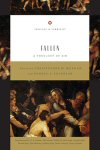
From marital infidelity to global war, the world is obviously broken, leaving people desperate to find an explanation for our universal sin problem. In the latest addition to the Theology in Community series, Christopher Morgan and Robert Peterson have assembled an interdisciplinary team of evangelical thinkers to explore the biblical doctrine of sin from a variety of angles. Among other contributors, popular scholar D. A. Carson discusses the contemporary significance of sin; seasoned professor Paul House details sin in the Old Testament law, prophets, and writings; and New Testament expert Douglas Moo explores sin from Paul’s vantage point. This team of top-notch scholars offers modern readers a comprehensive overview of this oft-neglected, biblical theme so that readers might learn to live better in a sinful world.
Contributors:
- Gerald Bray
- David B. Calhoun
- D.A. Carson
- Bryan Chapell
- Paul R. House
- John W. Mahony
- Douglas J. Moo
- Sydney H. T. Page
- Robert Yarbrough
These essays provide a very thorough mapping of sin’s ugly reality. Rarely do we meet such realism as we find here.
—J. I. Packer, board of governors’ professor of theology, Regent College
In this fine little volume, Morgan and Peterson provide an excellent one-stop treatment of the doctrine of sin. As we have come to expect with all of the volumes in the Theology in Community series, Fallen treats the doctrine of sin biblically, theologically, historically, and pastorally. This text should work very nicely for undergraduate or graduate students.
—Bruce Ashford, provost, dean of faculty, and associate professor of theology and culture, Southeastern Baptist Theological Seminary
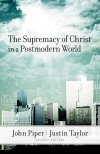
Six of today’s leading pastor-theologians—John Piper, Voddie Baucham, D.A. Carson, Timothy Keller, Mark Driscoll, and David Wells—have joined together to offer Christians a practical, biblical vision of Christ’s supremacy. After grounding readers in the important truths of Christ’s deity and the gospel, The Supremacy of Christ in a Postmodern World strives to help believers understand how to share these truths in a postmodern society. Through applying lessons from this book, readers gain a practical, biblical vision of ministry for the twenty-first century.
Many would have us believe that life is hopelessly fragmented and truth an elusive dream. The authors of this book beg to differ and enthusiastically point us to the cohesive centrality and absolute supremacy of Jesus Christ.
—Sam Storms, senior pastor, Bridgeway Church, Oklahoma City
Justin Taylor (PhD candidate, The Southern Baptist Theological Seminary) is vice president of book publishing and an associate publisher at Crossway. He has edited and contributed to several books, including A God Entranced Vision of All Things and Reclaiming the Center, and is a blogger at Between Two Worlds—hosted by The Gospel Coalition.
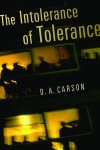
Tolerance currently occupies a very high place in Western societies: it is considered gauche, even boorish, to question it. In The Intolerance of Tolerance, however, questioning tolerance—or, at least, contemporary understandings of tolerance—is exactly what D. A. Carson does.
Carson traces the subtle but enormous shift in the way we have come to understand tolerance over recent years—from defending the rights of those who hold different beliefs to affirming all beliefs as equally valid and correct. He looks back at the history of this shift and discusses its implications for culture today, especially its bearing on democracy, discussions about good and evil, and Christian truth claims.
Using real-life examples that will sometimes arouse laughter and sometimes make the blood boil, Carson argues not only that the “new tolerance” is socially dangerous and intellectually debilitating but also that it actually leads to genuine intolerance of all who struggle to hold fast to their beliefs.
In these highly contentious times we need a renewed understanding of the meaning of true tolerance. True tolerance means taking our deeply held convictions seriously because understanding our differences actually makes a difference. Disagreements matter. True tolerance means engaging one another with civility and respect despite our differences. It is not incompatible with firm convictions or the desire to persuade others. In this timely book D.A. Carson argues that today true tolerance is not well tolerated. He makes a passionate plea for a recovery of an older form of tolerance, insisting that the existence of disparate views is vastly different from the acceptance of all views being equally valid. Important matters are at stake here, and Carson cogently explains why they are so urgent.
—Michael Cromartie, vice president, Ethics and Public Policy Center
Nothing is more intolerant than a tolerance that requires the absence of all convictions. Don Carson thoughtfully shows how tolerance, once defined as respecting others’ right to hold differing perspectives, has morphed into a pervasive insistence that no one should hold firm convictions. The consequence of such a shift is a challenge to biblical faith that needs a biblical response, which Carson ably provides. In doing so, he gives the biblical basis for true tolerance in a just society and shows the inevitable tyranny of tolerance ill-defined. Not to hear and heed him is to enter a nightmarish world in which zeal to discern truth is replaced by zeal to keep anyone from claiming anything is really true.
—Bryan Chapell, distinguished professor of preaching, Knox Theological Seminary
Sadly, the debate about Christianity has shifted from ‘is it true’ to ‘was anyone offended.’ The Bible assures us that the Gospel message will be offensive, although the Gospel messenger should be loving. Carson has done a masterful job of helping Christian leaders understand how to navigate a cultural context that is increasingly tolerant of seemingly everything but Christian belief.
—Mark Driscoll, preaching and speaking pastor, Mars Hill Church
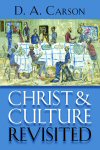
Called to live in the world, but not to be of it, Christians must maintain a balancing act that becomes more precarious the further our culture departs from its Judeo-Christian roots. How should members of the church interact with such a culture, especially as deeply enmeshed as most of us have become?
D.A. Carson applies his masterful touch to this problem. He begins by exploring the classic typology of H. Richard Niebuhr with its five Christ-culture options. Carson proposes that these disparate options are in reality one still larger vision. Using the Bible’s own story line and the categories of biblical theology, he clearly lays out that unifying vision. Carson acknowledges the helpfulness of Niebuhr’s grid and similar matrices but warns against giving them canonical force.
More than just theoretical, Christ and Culture Revisited is also designed practically to help Christians untangle current messy debates on living in the world. Carson emphasizes that the relation between Christ and culture is not limited to an either/or cultural paradigm—Christ against culture or Christ transforming culture. Instead Carson offers his own paradigm in which all the categories of biblical theology must be kept in mind simultaneously to inform the Christian worldview.
While many other books on culture interact with Niebuhr, none of them takes anything like the biblical-theological approach adopted here. Groundbreaking and challenging, Christ and Culture Revisited is a tour de force.
Don Carson here writes clearly, carefully, and helpfully about the timely topic of how Christians should engage culture. Well-suited to write such a volume, Carson exposes and explodes ‘egregious reductionisms’ which he says too often afflict Christians. We can’t reduce the relationship of Christ and culture to one model (Niebuhrian or otherwise). Reading this book has sharpened my own understanding. So buy the book you’re holding. Read it. Pass it along to folks in your congregation. And reduce ‘egregious reductionisms’!
—Mark Dever, senior pastor, Capitol Hill Baptist Church
There is no more crucial issue facing us today than the relationship of the church and the Gospel to contemporary culture. Don Carson’s treatment of this issue is the most balanced one out there. Rather than grinding an axe or pushing his own paradigm, he listens carefully to the Scripture and brings us in the end to a sophisticated simplicity about these matters. I highly recommend this book.
—Tim Keller, pastor, Redeemer Presbyterian Church
Make room on the shelf for this penetrating book by Carson . . . Carson engages with a stunning range of writers and texts.
—Christianity Today

In this solid evangelical commentary on John’s Gospel, a respected Scripture expositor makes clear the flow of the text, engages a small but representative part of the massive secondary literature on John, shows how the fourth Gospel contributes to biblical and systematic theology, and offers a consistent exposition of John as an evangelistic Gospel. The comprehensive introduction treats such matters as the authenticity, authorship, purpose, and structure of the Gospel.
Christianity Today - Number 1 Critic’s Choice for Commentaries & Runner-up Reader’s Choice (1992)
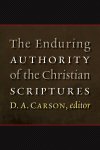
In this volume, thirty-seven celebrated evangelical scholars present a thorough study of biblical authority and a full range of issues connected to it.
D.A. Carson serves as editor for this volume. He has assigned the topics based upon a recognition that Scripture and its authority are now being both challenged and defended with renewed vigor. After an introduction by Carson to the many facets of the current discussion, contributors present robust essays on relevant historical, biblical, theological, philosophical, epistemological, and comparative-religion topics. Carson concludes by answering a number of frequently asked questions about the nature of Scripture, cross-referencing these queries to info in preceding chapters.
This comprehensive volume by a team of recognized experts will be an essential reference on the nature and authority of the Bible for years to come. Contributors include Henri Blocher, Craig Blomberg, Graham Cole, Paul Helm, Robert Kolb, Anthony Lane, Douglass Moo, Richard Lints, Andy Naselli, Timothy Tennant, Kevin Vanhoozer, Bruce Waltke, Barry Webb, John Woodbridge, and more!.
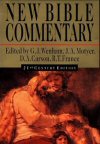
New Bible Commentary
- Editors: Gordon J. Wenham, J. Alec Motyer, Donald A. Carson, and R. T. France
- Edition: 21st Century Edition
- Publisher: IVP
- Publication Date: 1994
- Pages: xiii, 1,455
For 40 years, the New Bible Commentary has set the standard for works of its kind. Now in this completely revised fourth edition (including over 80% new and updated material), the New Bible Commentary is positioned to maintain its standing as the leading one-volume commentary on the whole Bible well into the 21st century.
This readable and accessible volume brings together many of the finest scholars of our day to meet the needs of students, teachers and Bible readers. The 21st-century edition of the New Bible Commentary offers 66 solid, concise, evangelical commentaries—one on each book of the Bible. These detailed (passage-by-passage or verse-by-verse) commentaries, based on the NIV text, are accompanied by introductory material on date, authorship, purpose, key themes, outlines and discussions of recent developments in biblical scholarship. In addition seven articles overview biblical history and types of biblical literature, including the Pentateuch, poetry, the Gospels, the Epistles, and the Apocrypha and other apocalyptic writings.
For many years I recommended the old New Bible Commentary as the best of its kind on the market. I expect to find myself saying the same of this new work that replaces it.
—J. I. Packer
Gordon J. Wenham is lecturer in Old Testament at Trinity College, Bristol. He was formerly professor of Old Testament at the University of Gloucestershire.
J. Alec Motyerr (M.A., B.D., D.D.) was formerly principal of Trinity College in Bristol, England. He has extensive experience in parish ministry and is well known as a Bible expositor.
R. T. France has taught at London Bible College and was principal of Wycliffe Hall, Oxford, from 1989 to 1995. He has also been the rector of seven Anglican parishes.
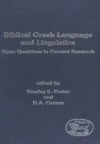
Do verbal tenses, such as aorist and imperfect, actually communicate a temporal reference—time—or do they communicate something else entirely—aspect? Or can the tenses sometimes communicate both time and aspect? The verbal aspect debate is one of the hottest topics in Biblical Greek linguistics. Edited by Stanley E. Porter and D.A. Carson, Biblical Greek Language and Linguistics brings together into one volume essays from scholars in the field of Greek and linguistics to examine the Greek language from a linguistic and grammatical perspective.
The first half of the book is devoted to verbal aspect, and includes essays by Stanley E. Porter and Buist Fanning, two central figures in the debate over verbal aspect. The second part of the book contains a potpourri of articles on other applications of modern linguistics to the Greek Bible, and includes essays by Jeffrey T. Reed, Paul Danove, Michael W. Palmer, and Mark S. Krause.
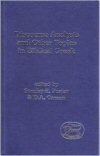
Discourse analysis is the study of the rules or patterns characterizing units of connected speech or writing. The essays here were first presented at the Society of Biblical Literature in the early 1990s. Stanley E. Porter contributes two chapters which survey discourse analysis—one dealing with New Testament studies and the other on how biblical discourse can be analyzed. Topical chapters include these subjects: identifying the theme in the New Testament; recognizing prominence in the text; interpreting the language of Paul; syntactical background studies; and diachronic analysis.
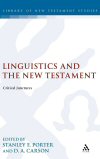
Linguistics and the New Testament: Critical Junctures
- Editors: Stanley E. Porter and D.A. Carson
- Publisher: Sheffield Academic Press
- Publication Date: 1999
- Pages: 297
Linguistics and the New Testament explores what the editors believe are crucial phases in the application of linguistics to New Testament Greek. The first half of the volume includes essays on such topics as linguistics and literary criticism, linguistics and historical criticism, and linguistics and rhetoric. The second half includes essays dealing with the relations and uses of individual words, but ranges from oral composition to the value of word frequency in determining authorship. Some of these essays review established models of research, while others propose new models and criteria of linguistic analysis.
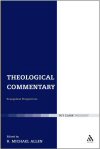
This text provides a compilation of commentaries for the benefit of the church’s wisdom, witness, and worship. The book includes essays by R. Michael Allen, Henri Blocher, D. A. Carson, Michael Horton, Kelly M. Kapic, Andrew McGowan, R.W.L. Moberly, Daniel J. Treier, and Kevin Vanhoozer. Each essay addresses a specific passage of Scripture with the intention of helping Christians think more clearly about their lives in relation to the word of God.
This excellent collection brings together some fine examples of the theological interpretation at work on particular biblical texts, along with some sympathetic assessments of the prospects for reading Scripture theologically. Each of the essays demonstrates exegetical finesse, theological alertness, and sensitivity to the spiritual dimensions of study of Scripture; taken together, they deserve a wide and attentive readership.
—John Webster, professor of systematic theology, University of Aberdeen, Scotland
The twofold task skillfully undertaken in this volume should inspire all Christians . . . Michael Allen is to be commended for his vision of theological renewal.
—Matthew Levering, professor of religious studies, University of Dayton
R. Michael Allen is an assistant professor of systematic theology at Knox Theological Seminary in Fort Lauderdale.
About D.A. Carson
D.A. Carson (b. 1946) is one of the most respected New Testament scholars in the world. A respected teacher, author, and speaker, he is currently research professor of New Testament at Trinity Evangelical Divinity School, and the president of The Gospel Coalition.
He has served as pastor of Richmond Baptist Church and as the first dean of the seminary of Northwest Baptist Theological College, now known as Northwest Baptist Seminary. Carson lectures in academic and church settings around the world, and is the author of more than 50 books.